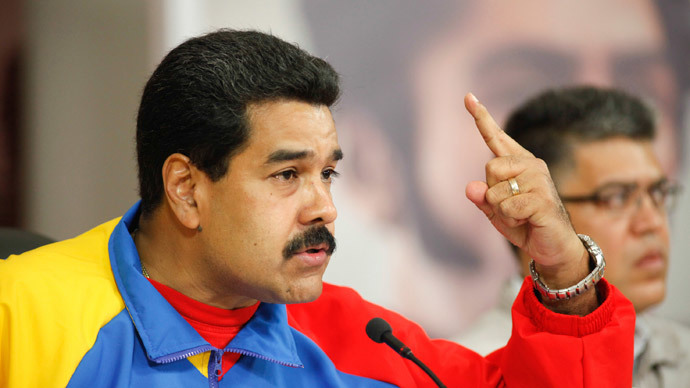

Venezuela's President Nicolas Maduro speaks during a national broadcast at Miraflores Palace in Caracas, Feb. 16.


Venezuela’s President Nicolas Maduro speaks during a national broadcast at Miraflores Palace in Caracas, Feb. 16.
Feb. 18 — The current violence by rightist forces opposing the Bolivarian Revolution is a continuation of the siege that began in 2001 when President Hugo Chávez approved 49 economic laws in the framework of the Enabling Law of 2001. At that time, particularly the Land Law and the Law on Hydrocarbons represented the first threat of the revolution to the economic power of the comprador bourgeoisie and its imperialist allies. This was years before Commander Chávez, who died a year ago on March 5, declared socialism as a path for the revolution.
The threat was such, that in December 2001 the Venezuelan Federation of Chambers of Commerce — FEDECAMARAS — together with private media corporations and the pro-business Confederation of Workers initiated actions to destabilize the country, including work stoppages. These culminated with the April 2002 coup d’état and the 2002-03 oil sabotage.
Since then, although the actors have changed, the forces behind the siege are the same: the Venezuelan oligarchy, together with foreign forces aided and abetted by organizations of the U.S. State Department, primarily the U.S. Agency for International Development and the National Endowment for Democracy.
After Chávez’s death, Washington and right-wing forces in Venezuela have increased the destabilization campaign against the revolution, thinking that the current president, Nicolás Maduro, would not have the drawing power of his predecessor. To date, however, all their efforts have been in vain. Especially after the municipal elections last December when most people showed their support and the Bolivarian forces won a large majority, gaining 75.5 percent of the municipalities.
New terror campaign by the right
It is no surprise that now, after passage of the new Enabling Law that President Maduro proposed, the right-wing has intensified the ongoing coup plan. This law will give the state greater control over foreign exchange and financial resources.
This attack on the government began Feb. 12, as the country was celebrating the Bicentenary of the Battle of the Victory and Youth Day with a massive march through the capital.
In a wave of violence that attempted to reproduce the coup of 2002, mobs of young rightists attacked government buildings, including, among others, the Public Ministry and Venezuelan State Television. They almost entirely destroyed the facade of the building of the Attorney General of the Republic. They also destroyed underground train facilities and vehicles, burned tires and trash, and committed other violent actions.
A confrontation with a peaceful demonstration of young revolutionaries left a balance of three dead, 60 injured and dozens arrested.
Days earlier, in the state of Táchira on the border with Colombia, right-wing groups threw stones at the governor’s residence where rehabilitation facilities offering free therapy to the population are installed.
Who are the main opposition figures?
These mobs responded to the call by Leopoldo López, the leader of the Voluntad Popular (Popular Will) Party and candidate of the bourgeoisie of Chacao, one of the wealthiest areas of Caracas and opposition protests headquarters. López told reporters that the protests will end “when we can get out [of office] those who are governing us.” (Telesur)
López is a product of the Kennedy School of Government at Harvard University and Kenyon College in the U.S. He was mayor of Chacao, but the Supreme Court barred him from any public office after he received illegal funds from the state oil company, PVDSA, for his political organization Justice First through his mother, Antonieta Mendoza, who was then an official of PDVSA.
López has ties to former Colombian paramilitary President Álvaro Uribe, with whom he has met. At a press conference López said their conversation “focused mainly on how to recuperate security in Venezuela.” (VTV Multimedia) It is public knowledge that Colombian paramilitaries have infiltrated Venezuela to promote violence and help the opposition destabilize the country.
Now López is a fugitive from Venezuelan justice, which has issued an arrest warrant for his role in the Feb. 12 crimes. He claims to still be in Venezuela. Lined up with López is opposition deputy María Corina Machado, a daughter of the elite and head of the right-wing SUMATE organization that receives USAID funding.
Venezuela challenges U.S. threats
There is no doubt that Washington supports López. President Maduro reported on Feb. 16 on national television that the U.S. government demanded that he “dialogue with the opposition, release all detainees from the recent riots and thirdly, they threatened that ‘the arrest of Mr. Leopoldo López may cause negative consequences with international ramifications, requesting the suspension of the legal actions against him.’” (VTV)
Maduro called these “insolent and unacceptable demands. For the U.S. government, human rights are the rights of the right-wing to commit crimes. … There will be no force that will stop us, the Bolivarian people. In Venezuela, we are willing to go till the end in defense of peace and democracy.”
Maduro also announced that the country will expel three U.S. embassy officials for involvement in meetings to conspire against the Venezuelan government. He further reported that on Feb. 17 he would call the presidents of Latin America. He added that he is now in a campaign to denounce the threats by the United States government.
As part of Workers World newspaper’s coverage marking the 50th anniversary of the liberation of…
From the PFLP Central Media Office The following statement from the Popular Front for the…
Newark, New Jersey Over 250 people, representing over 250 New Jersey endorsing community groups, attended…
Special to Workers World The following is a press release issued on April 24, 2025,…
dear Larry Krasner, we heard you sued Elon Musk over his corrupt million election giveaways…
Unions join forces against harassment and deportation of members When 200 immigrant workers – from…